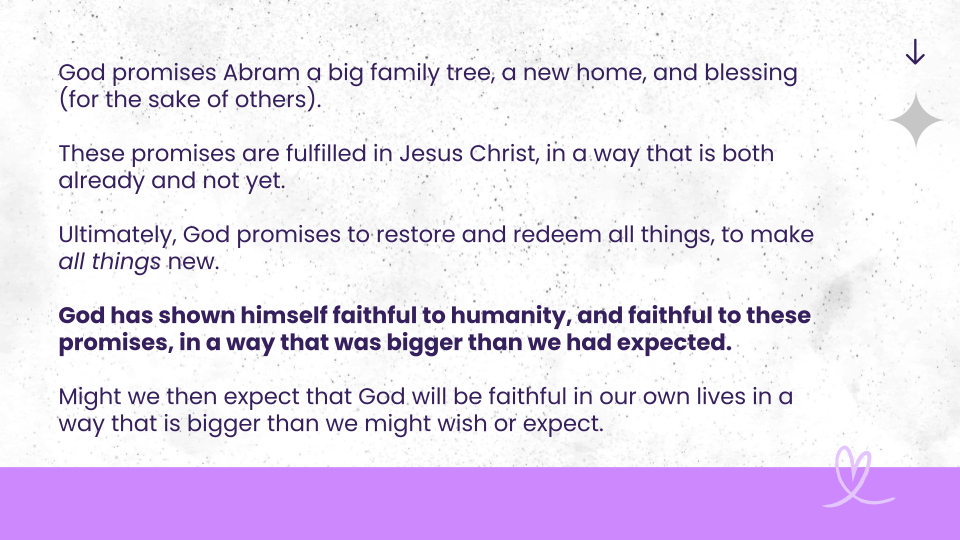God’s promises to Abraham are a key part of the entire Biblical narrative. In Genesis 12, we see God enter into a covenant with one person (Abram, later renamed Abraham), and this establishes a relationship and a promise to restore and renew all things. God’s promises to Abraham, in fact, restore what was broken in the Fall (when Adam and Eve chose to turn away from God and follow their own plans). But it isn’t until the very end that we see these promises come to fulfillment. We can trace God’s promises through the Old Testament and the New Testament, and we can see how God is faithful to these promises, but in ways that are surprising and are far bigger than we ever expected.
For more on the promises of God and to see how the promise of “blessing” works out in our lives, be sure to check out these 160+ promises of God from Scripture.
God’s Promises: A Quick Summary
God promises to Abraham:
- a big family tree (many descendants and a legacy)
- a new home
- blessing (for the sake of others)
God’s promises are fulfilled:
- in Jesus Christ, where God takes on human nature and fulfills his end of the agreement and ours
- in a way that includes all humanity
- by making all things new
- by restoring what was broken in the Fall (of Adam and Eve)
- in the promise of a Kingdom that is both now and not yet
God’s Kingdom is one where all things are put in their proper place, and all things are renewed. We are not given an earthly kingdom with political power, wealth, and freedom here and now. Rather, we are promised a Kingdom where there will be an end to suffering, and where all things will be as God intended them to be, brought to fruition, completion, and perfection. (This Kingdom is picture in the book of Revelation, especially chapters 21 and 22.)
This Kingdom has begun in our hearts and in our world, here and now, when we welcome God’s Holy Spirit into our lives and allow those lives to be transformed into lives in tune with God.

God’s Promises to Abraham
We find God’s promises to Abraham in the book of Genesis. In Genesis 12, God chooses one person – Abram, later renamed Abraham – with whom he enters into a covenant (an agreement) in which he promises descendants, a new home, and blessing. He says to Abram, “Go from your country, your people and your father’s household to the land I will show you.
“I will make you into a great nation,
and I will bless you;
I will make your name great,
and you will be a blessing.
I will bless those who bless you,
and whoever curses you I will curse;
and all peoples on earth
will be blessed through you.”
(Genesis 12:1-3)
There are two interesting things to note, right away, about God’s promises to Abram in this passage.
First, the covenant that Abram enters into with God here involves Abram leaving his own country, leaving what is comfortable behind and trusting God by going somewhere new. God promises us, as well, blessing, provision, and renewal, but it comes through stepping out of what’s comfortable and following God on a path that might seem strange, or frightening, or challenging, or unexpected.
Second, what God promises is this: many descendants (or a big family tree), a new home, and blessing, not just for Abram but for all peoples on earth. The blessing that he promises is blessing for others.
In response to these promises, Abram packs up his family (which consists of his wife and his nephew at the time) and all of his possessions and he does as he is told, leaving his home country for a new land.
God’s Promises to Abraham in the Old Testament
What follows in the Old Testament is a working out of God’s promises to Abraham.
First, God fulfills his promises of descendants by giving Abraham and Sarah a son (both are renamed at this point – Abraham, meaning “father of many”, and Sarah meaning “princess”, since she will be the mother of many nations, with kings coming from her). This son comes in Abraham and Sarah’s old age, far past the point when they expected to have children, and after they tried to take matters into their own hands and fulfill this promise of descendants on their own, without God’s help.
We see, after this, a long history of the people of Israel – Abraham’s descendants – trying to follow God’s plan and failing. God gives the Ten Commandments – the rules for how to best engage in community and in the world – to Moses, but the people fail to follow what God tells them to do.
God repeatedly promises reward for obedience, and when the people do follow God’s instructions, things tend to go well, whereas when they ignore God’s guidance and do what is right in their own eyes (as in much of the book of Judges), there is an increase in violence, greed, conflict, and suffering.
Ultimately, the people fail to uphold their part of the covenant – the agreement. They do not bring blessing to the world around them, although there are bright spots and places of hope in the story, instances of kings and leaders following God closely and blessing those around them. But on the whole, the people do not carry the blessing of God to other nations, and they remain stuck in cycles of violence, wandering, and captivity. This continues on throughout the whole Old Testament, with continual reminders of God’s faithfulness, and continual prophecies of hope and a coming messiah.
God’s Promises to Abraham in the New Testament
And then, we have the birth of Jesus. This is the first big surprise in the story – and there are more surprises coming. The people of Israel had been awaiting a messiah – someone come to fulfill the promises that God had made to Abram all those years ago. They expected this to come in the form of an earthly king, of freedom from slavery and captivity, and in the form of a promised land – a physical place here on earth where God would kick out the “bad guys” in the story from the land, and God’s chosen people would live there forever.
Well…that’s not quite what happened. God had a bigger plan than that. With the birth of Jesus – who was in the family line of Abraham – we see a confirmation and a deepening of the promises of legacy, descendants, blessing, and land given to Abraham. Whereas the Old Testament describes a covenant that God made with humanity, where human beings continually fail to uphold their end of the covenant, in the New Testament we see God himself come to uphold both his end of the covenant and ours.
Jesus himself calls this the “new covenant”. We can find this in the Gospel according to Luke, when Jesus, during the last supper with his disciples, says to them, “This cup is the new covenant in my blood, which is poured out for you” (22:20).
The new covenant is the promise that God makes with humanity that he will restore their relationship with him. He will walk with them, will write his law on their hearts, and he will forgive their transgressions.
Part of the “newness” of this new covenant is a re-thinking of what the promise of land (or a new home) looks like. While God’s promise to Abraham was interpreted to mean that Israel would inherit a specific patch of land that was given physical boundaries in the Old Testament, Jesus does not give to the people of Israel a physical kingdom here and now. Instead of overthrowing the political powers at the time, Jesus submitted to those powers even to the point of death on a cross in order to descend even into death itself and to raise creation back up with him.
This is the surprise in the story. Instead of an earthly king who will give the people political power and physical land, God comes in the form of a servant king, even a dying king.
The problem that we encounter in the Fall – and the problem that plagues the people of Israel throughout the OT – is that humanity tried to set out on their own, to be the creators of their own destiny, so to speak, to make their own rules and be able to say for themselves what is right and wrong. The solution, then, is to restore humanity to its rightful place as creatures obedient to their Creator. Human beings need to lay down their own self-will, their desire for self-determination and independence, and to submit their wills to that of their Creator. Jesus does this on our behalf, and it is effective because he is both God (and thus able to do this) and human (and thus part of the race that needs to do this).
C.S. Lewis, in Mere Christianity, describes this as introducing a “good infection” into the human race. God takes on human nature and submits it to death. In doing so, he turns our death that was a punishment into a “mystical death”, into the means of eternal life. Because Jesus is connected to all humanity through a great and growing family tree, that “good infection” can spread to the rest of us, turning us – ever so slowly – into the creatures that we were always intended to be.
We see the beginnings of the fulfillment of God’s promises within Jesus’ earthly life, as well. In his ministry of healing, deliverance, and forgiveness we see the start of God putting the world right again. Evil was being overcome, the effects of estrangement from God were being reversed.
And we find more surprises in the New Testament as well. It turns out that God’s promises were not just for the people of Israel, but for all humanity. God makes it clear that even the Gentiles (the non-Jews) – even the outsiders – are welcomed into the new life promised through Jesus Christ.
And so, God’s promise is fulfilled not in an earthly kingdom with political power, but rather in the promise of a new kingdom where relationships are restored and all things are made new. If we follow this line of thought all the way to the book of Revelation, we can see that God’s plan is a plan to renew all things; our “new home” is not a particular patch of land with physical, geographical, and political boundaries, but rather it is all creation made right. In Revelation 21:5, God makes this clear, saying: “Behold, I am making all things new”.
God’s Promises to Abraham in Revelation
God’s promises to Abraham, and to all humanity, are ultimately fulfilled in Revelation. This is where we find John’s vision of the new creation: where all things will be made new and all things will be made right. This new creation began when God took on human nature in Jesus Christ and introduced that transformation in us.
The vision in Revelation is that a newly restored earth will become one with heaven and we will live on this renewed earth with God forever. This is pictured at the end of the book of Revelation in chapters 20 — 22 (and in chapter 8 of Romans too). There will be no more sickness, no more pain, no more sin. Evil will have been banished once and for all. And every moment of healing and restoration and justice we taste in our lives and world today are a foretaste of what lies ahead. The world God imagined, the world we all long for, will become the reality.
In Revelation, we see a picture of what the “promised land” (our new home) really looks like (*although the description is necessarily metaphorical, probably because God’s Kingdom is so much bigger and different than anything that we could describe here and now):
- The city that has twelve gates, with twelve angels at the gates – representing the twelve tribes of Israel. This number could signify that this city is for all of God’s people. This is imagery of inclusion, of bring all the prodigals, all the lost sheep, back home.
- The streets in this city are made of gold, the walls are decorated with precious stones, and the foundation is made up of twelve precious elements – jasper, sapphire, agate, emerald, onyx, ruby, chrysolite, beryl, topaz, turquoise, jacinth, and amethyst. Note the imagery of precious materials, of abundance and beauty, and of completion.
- Jesus is at the center of this city. And it is Jesus, the Lamb, who is the light who enlightens the world. We could take this literally or metaphorically (or both!). When John describes Jesus as the light of the world, is he indicating that it is Jesus who brings truth, vision, insight…?
- In the city, there is the river of the water of life, and the tree of life that bears twelve crops of fruit. “And the leaves of the tree are for the healing of the nations” (Revelation 22:2). Again there is imagery of provision, abundance, and healing.
- Jesus also describes a “second death” (Revelation 21:8), a possibility to refuse the grace of God. So while blessing is offered to all people, and all things are made new, God still gives human beings free will. We still have the ability to turn away.
C.S. Lewis once said that “the door to heaven is locked from the inside”. It seems as though God will not turn away any person, and that he desires all things to be made right. But it also seems that he will not force a rebel into submission. The question, perhaps, is then whether we are turned toward God and welcome his grace and renewal, or whether we turn towards ourselves and refuse the welcome that God gives us.
How God’s promises to Abraham restore what was broken in the fall
The promises that God makes to Abraham, and that are fulfilled in Jesus Christ, restore what was broken in the fall. Where God told Adam and Eve to be fruitful and multiply, he promises Abram many descendants. He assures Abraham that, even though humanity had fallen away from God and from their intended purpose, he will make the people that Abraham leads into a great nation. He promises land, a home for humanity, that might remind us of the home that we lost in the fall. And he promises blessing for all peoples of earth through Abraham and his descendants.

